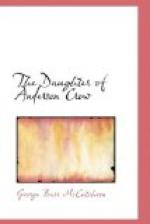Inside a capacious and official pocket of Mr. Crow’s coat reposed a letter from a law firm in Chicago. It asked if within the last two years a young woman had applied for a position as teacher in the township schools at Tinkletown. A description accompanied the inquiry, but it was admitted she might have applied under a name not her own, which was Marion Lovering. In explanation, the letter said she had left her home in Chicago without the consent of her aunt, imbued with the idea that she would sooner support herself than depend upon the charity of that worthy though wealthy relative. The aunt had recently died, and counsel for the estate was trying to establish proof concerning the actions and whereabouts of Miss Lovering since her departure from Chicago.
The young woman often had said she would become a teacher, a tutor, a governess, or a companion, and it was known that she had made her way to that section of the world presided over by Anderson Crow—although the distinguished lawyers did not put it in those words. A reward of five hundred dollars for positive information concerning the “life of the girl” while in “that or any other community” was promised.
Miss Banks’s appointment came through the agency of the district’s congressman, in whose home she had acted as governess for a period. Moreover, she answered the description in that she was young, pretty, and refined. Anderson Crow felt that he was on the right track; he was now engaged in as pretty a piece of detective business as had ever fallen to his lot, and he was not going to spoil it by haste and overconfidence.
Just why Anderson Crow should “shadow” the schoolhouse instead of the teacher’s temporary place of abode no one could possibly have known but himself—and it is doubtful if he knew. He resolved not to answer the Chicago letter until he was quite ready to produce the girl and the proof desired.
“I’d be a gol-swiggled fool to put ’em onter my s’picions an’ then have ’em cheat me out of the reward,” he reflected keenly. “You cain’t trust them Chicago lawyers an inch an’ a half. Doggone it, I’ll never fergit that feller who got my pockit-book out to Central Park that time. He tole me positively he was a lawyer from Chicago, an’ had an office in the Y.M.C.A. Building. An’ the idee of him tellin’ me he wanted to see if my pockit-book had better leather in it than hisn!”
The fact that the school children, big and little, loved Miss Banks possessed no point of influence over their elders of the feminine persuasion. They turned up their Tinkletown noses and sniffed at her because she was a “vain creature,” who thought more of “attractin’ the men than she did of anything else on earth.” And all this in spite of the fact that she was the intimate friend of the town goddess, Rosalie Gray.
Everybody in school No. 5 over the age of seven was deeply, jealously in love with Miss Banks. Many a frozen snowball did its deadly work from ambush because of this impotent jealousy.




